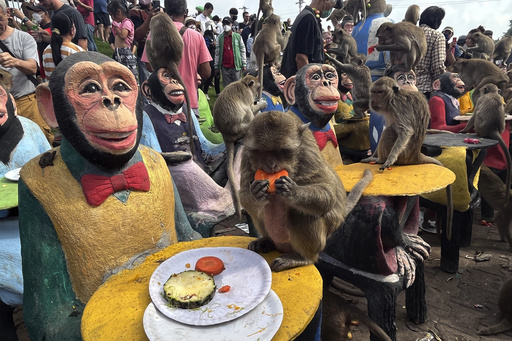BANGKOK (AP) — Thai wildlife officials laid out a plan on Wednesday to bring peace to a central Thai city after at least a decade of human-monkey conflict.
The macaques that roam Lopburi are a symbol of local culture, and a major tourist draw. But after years of dangerous encounters with residents and visitors and several failed attempts to bring peace with population controls, local people and businesses have had enough.
The monkeys frequently try to snatch food from humans, sometimes resulting in tussles that can leave people with scratches and other injuries. But outrage grew in March when a woman dislocated her knee after a monkey pulled her off her feet in an effort to grab food, and another man was knocked off a motorcycle by a hungry monkey.
Authorities hope to round up some 2,500 urban monkeys and place them in massive enclosures, said Athapol Charoenshunsa, the director-general of the Department of National Parks, Wildlife and Plant Conservation. They’ll work with wildlife experts to find a way for a limited number of monkeys to stay at liberty in the city, he added.
“I don’t want humans to have to hurt monkeys, and I don’t want monkeys to have to hurt humans,” he told reporters during a news conference in Bangkok.
An official monkey catching campaign was launched week, prioritizing more aggressive alpha males. It has caught 37 monkeys so far, most of whom have been placed put under the care of wildlife authorities in the neighboring province of Saraburi, while others were sent to the Lopburi zoo.
Officials said they plan to capture the rest of the monkeys once the enclosures are complete, especially those in the residential areas. Separate cages will be prepared for different troops of monkeys to prevent them from fighting.
Athapol said he expects the first phase of the operation to start within weeks, and believes the huge cages will be able to contain thousands of them and “will solve the problem very quickly.”
The monkeys are a symbol of the province, about 140 kilometers (90 miles) north of Bangkok, where the ancient Three Pagodas temple celebrates an annual “Monkey Buffet” festival, and they’re commonly seen throughout the city. Macaques are classified as a protected species under Thailand’s wildlife conservation law.
Some have blamed the city’s monkey troubles on tourists and residents feeding the animals, which they say drew monkeys into the city and boosted their numbers, as well as getting them accustomed to getting food from humans.
But an earlier effort to limit feeding may have made things worse, some residents say. Local officials began threatening fines for feeding monkeys outside a few designated areas around the main tourist attractions in recent years. But those feeding areas were dominated by a few troops of the highly territorial creatures, while rival bands grew hungry and turned to harassing humans in other areas for food even more.
Athapol said people shouldn’t see monkeys as villians, saying that the authorities might have not been efficient enough in their work to control the simian population.
People also need to adapt to the city’s monkeys, said Phadej Laithong, director of the Wildlife Conservation Office, explaining that a lack of natural food sources prompts the animals to find food wherever they can, including from humans.
Previous control measure have fallen short. From 2014-2023, the wildlife authorities neutered about 2,600 Lopburi monkeys.
Athapol said they are also working in other areas of Thailand that are facing problems with monkeys, such as Prajuab Kiri Khan and Phetchaburi. He said 52 of the country’s 77 provinces report frequent problems from monkeys.
This website uses cookies so that we can provide you with the best user experience possible. Cookie information is stored in your browser and performs functions such as recognising you when you return to our website and helping our team to understand which sections of the website you find most interesting and useful.
